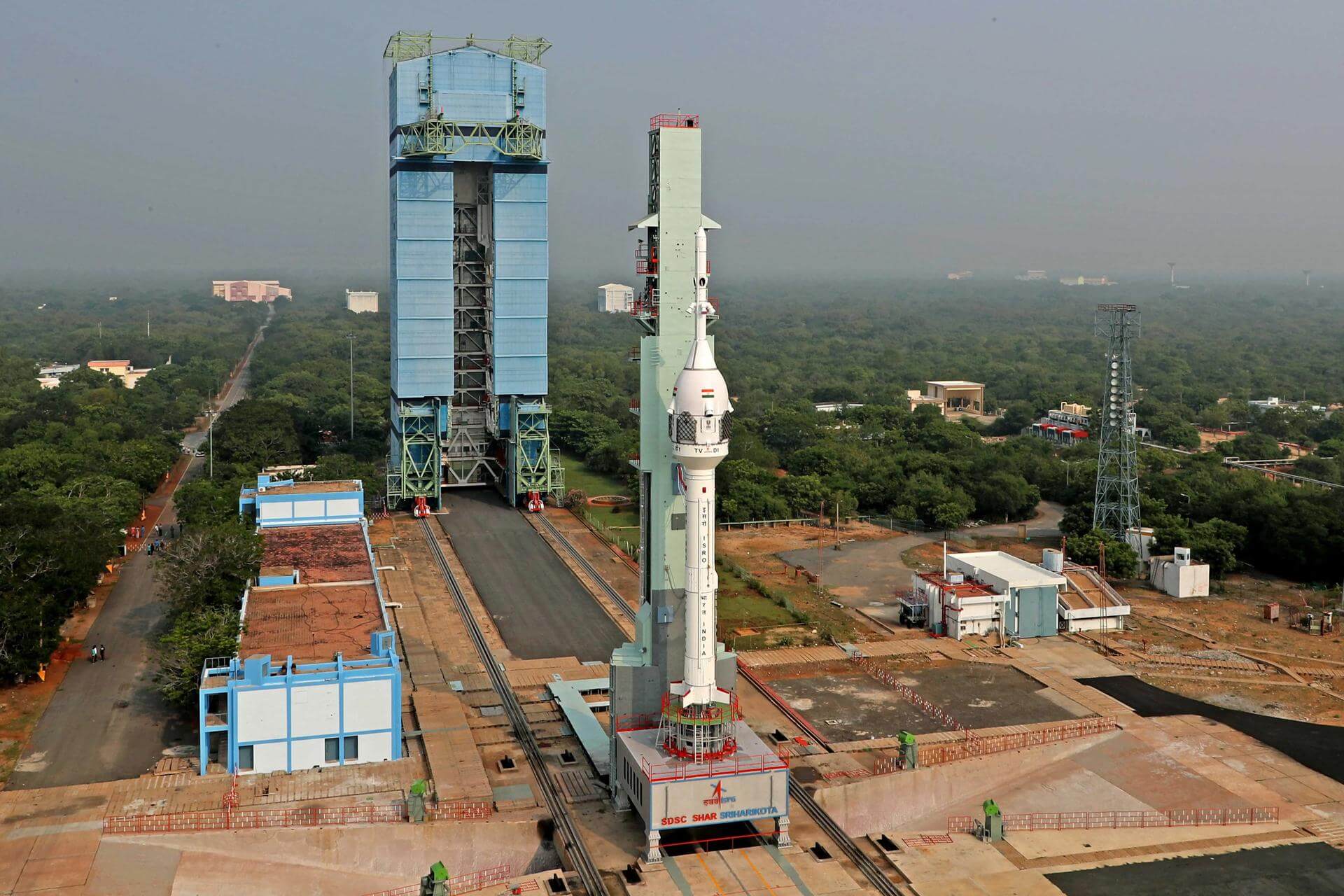Satish Dhawan Space Centre Launch Schedule
Stay updated on Satish Dhawan Space Centre's rocket launches with our real-time schedule. You can see 18 planned space missions on our website. Watch the live stream of any Satish Dhawan Space Centre rocket launch happening today.
Launch Status
TBD
Date & Time
Mar 2026
Location
Pad
Satish Dhawan Space Centre First Launch Pad
Launch Service Provider
Vehicle
Mission
TV-D2
Mission Type
Test Flight
Destination
Suborbital
The second inflight abort test of the Gaganyaan program.
Last Update: Pushed to NET early 2024.
🔔 Set up an email alert for upcoming launches
Get a weekly email containing all launches scheduled for the coming week.
Upcoming Satish Dhawan Space Centre Launches
TBD
Mar 2026
GISAT-1A (GEO Imaging Satellite) is an Indian earth observing satellite operating from geostationary orbit to facilitate continuous observation of Indian sub-continent, quick monitoring of natural hazards and disaster.
Last Update: Reverted back to NET March with cancellation of NOTAMs.
TDS-01 (Technology Demonstration Satellite-01) is an Indian geostationary orbit technology demonstration satellite carrying payloads for the Indian Space Research Organisation (ISRO)’s Institute of Plasma Research, Gandhinagar and the CSIR-CEERI, Pilani. Payloads to be tested included an internally developed 300 mN electric powered thrusters, atomic clocks, travelling wave tube amplifiers (TWTA) & a quantum communication suite (QuTDS).
Last Update: NET Q1 2026.
TBD
Mar 2026
Last Update: Reverted back to NET Q1.
TBD
Mar 2026
Oceansat-3A is a part of ISRO's Oceansat program. Its main purpose is ocean observation, which includes gathering ocean color data, sea surface temperature measurements and wind vector data.
Last Update: Reverted back to NET Q1 2026.
TBD
2026
First uncrewed orbital test flight of the Gaganyaan capsule.
Last Update: NET H2 2026.
TBD
2026
Second uncrewed orbital test flight of the Gaganyaan capsule.
Last Update: NET 2026.
RISAT-2A is the third in the series of radar imaging RISAT satellites. The satellite carries a sophisticated synthetic aperture radar that operates at 5.35 GHz in C band.
Updated: Nov 14, 11:30pm UTC
TBD
2026
Space Machines Company (SMC)'s second Optimus Orbital Transfer Vehicle (OTV), will launch on a mission designated Space MAITRI (Mission for Australia-India’s Technology, Research and Innovation). The mission will focus on debris management and sustainability, and will significantly advance Australia’s domestic space industry by combining Australian spacecraft capabilities with India's launch expertise. After separation, Optimus will perform a series of propulsive on-orbit maneuvers to inspect a space object in close proximity. It will then spend several months on orbit examining space debris to demonstrate affordable and accessible space sustainability technologies.
Last Update: NET late 2026.
TBD
2026
Third uncrewed orbital test flight of the Gaganyaan capsule.
Updated: May 14, 5:00pm UTC
TBD
2026
This is a replacement satellite for the Indian Regional Navigation Satellite System. The constellation will provide India with an alternative to GPS and will be used for military and civilian use. Located at a geosynchronous orbit, the system will be operated by the Indian government.
Last Update: NET December.
TBD
2026
First launch of Skyroot Aerospace's Vikram-I launch vehicle, with several cubesats on board. Payload identities TBD.
Last Update: Reverted to 2026 TBD pending launch period updates.
TBD
Mar 2027
First crewed flight of the Gaganyaan capsule.
Last Update: NET Q1 2027.
Astroscale's ISSA-J1 (In-situ Space Situational Awareness-Japan 1) mission will diagnose and inspect two large satellite debris in orbit by imaging and diagnosing them in close proximity after rendezvous. The satellite is built on Astroscale’s heritage in rendezvous and proximity operations, inspection and characterization capabilities
Updated: Sep 14, 11:30pm UTC
Chandrayaan-4 is a planned lunar sample-return mission of Indian Space Research Organisation (ISRO) and will be the fourth mission of its Chandrayaan programme. The mission consist of five modules, namely the DM (Descender Module), AM (Ascender Module), TM (Transfer Module), RM (Re-entry Module) and PM (Propulsion Module). The planned mission life is 1 lunar day and the landing site will be near the Lunar South Pole. The second launch will lift the TM (Transfer Module), RM (Re-entry Module) and PM (Propulsion Module) to orbit.
Updated: Oct 22, 1:00am UTC
Chandrayaan-4 is a planned lunar sample-return mission of Indian Space Research Organisation (ISRO) and will be the fourth mission of its Chandrayaan programme. The mission consist of five modules, namely the DM (Descender Module), AM (Ascender Module), TM (Transfer Module), RM (Re-entry Module) and PM (Propulsion Module). The planned mission life is 1 lunar day and the landing site will be near the Lunar South Pole. The first launch will lift the DM (Descender Module) and AM (Ascender Module) to orbit.
Updated: Oct 21, 11:30pm UTC



